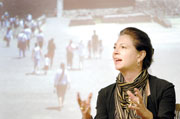U.S.-Mexican relationship evolving

Guest speaker Loretta Bondi addresses the audience during the evening session of the Gockel Symposium in Webster Hall auditorium.
Students and faculty gathered to learn about the evolution of the political relationship between the United States and Mexico.
The opening address of the ninth annual Gockel International Symposium on Sept. 20 was given by Armand Peschard-Sverdrup, director of the Mexico Project at the Center for Strategic and International Studies in Washington, D.C.
University President Julio León opened the address, calling the Symposium the “crown jewel” of the Mexico Semester.
León went on to say the themed semesters are unique to Southern, and are done because of the international mission of the University.
“Mexico is obviously a very important country to the United States,” León said, concluding with the statement that Southern students should take advantage of the opportunities available during the Mexico semester.
Dr. Tom Simpson, associate professor of social science, was the moderator for the event, and introduced Peschard-Sverdrup as being “enormously qualified” to talk about Mexico and the United States.
Peschard-Sverdrup began his talk by saying it was an honor for him to be invited to the Symposium for several reasons.
He said he was impressed by the University’s commitment to international issues, and by a faculty trip to Mexico. He said many of the people in Washington, D.C., making policy for Mexico have never traveled there.
Originally, the talk Peschard-Sverdrup was going to give was titled, “U.S.-Mexico Relations: From Drugs and Thugs to a More Strategic Partnership,” but he decided to change it to “From Mutual Mistrust or Distrust to a Spirit of Mutual Cooperation” at the last minute. The new talk was geared more toward examining the evolution of the Mexico-U.S. relationship.
Peschard-Sverdrup began by saying Mexico had been under single-party rule for 71 years, and the government was not as democratic as ours. For 67 of those 71 years, the respective president’s party had the majority in both houses, leading to a “rubber stamp congress,” which essentially meant anything the president wanted done, would be done.
“It has been referred to as a ‘perfect dictatorship,'” Peschard-Sverdrup said.
He went on to give numerous examples of incidents occurring causing one country to not trust the other, with both countries sharing the blame.
He went on to say the relationship started to change in 1997, when the ruling party lost control over the lower house. In 2000,
President Vicente Fox was elected.
For the first time in 71 years, an opposition candidate had been voted into office. In the same year, Fox’s party lost control over the senate, finally making Mexican Congress more democratic, since it was no longer all one party.
During a question-and-answer session moderated by Simpson, the speaker encouraged students to ask questions. Faculty and students asked a variety of questions leading Peschard-Sverdrup to further expound on Mexico.
In response to one question, Peschard-Sverdrup said the biggest threat to Mexico’s national security is organized crime, which has grown to include trafficking people as well as drugs. The United States, whose shared border is some 2,000 miles, also perceives this as a threat, because of the fear of terrorists coming into the United States from Mexico.
Peschard-Sverdrup said the United States and Mexico are currently trying to find a way to identify “legitimate goods and people” who cross back and forth between the countries regularly and allow them to cross the border “in a timely manner” so border patrols can spend more time focusing on suspicious goods and people. He said the Department of Homeland Security just announced a tightening of border security. However, the order came from Carl Rove’s office as a result of pressure from border states such as Arizona and New Mexico, who do not have enough border patrols.
Peschard-Sverdrup also discussed Mexico’s economy.
“It’s the victim of bad government,” he said.
He said the Mexican government, for years, had not invested in education or infrastructure, but the Fox administration is trying to correct that. There is wealth in Mexico, though.
“You would be amazed at how much money is in Mexico,” Peschard-Sverdrup said. However, the money is not equally distributed, with the majority of it being near the United States border, and almost none in the southern part of Mexico.
Despite parts of Mexico’s economy being poor, Peschard-Sverdrup concluded by saying students should visit anyway.
“It’s a country that’s rich in history and culture and has a lot to offer,” he said.
Your donation will support the student journalists of Missouri Southern State University. Your contribution will allow us to purchase equipment and cover our annual website hosting costs.



























